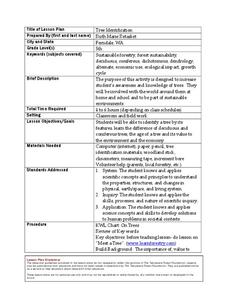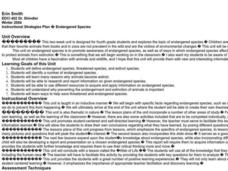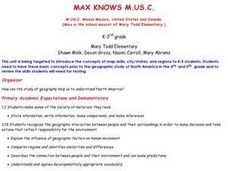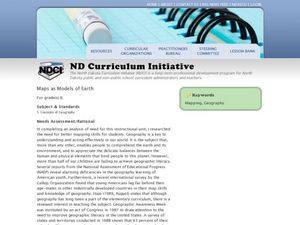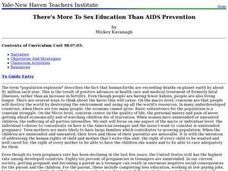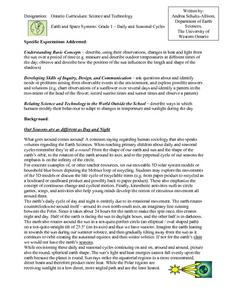Curated OER
Tree Identification
Students list four ways to identify trees. In this tree identification instructional activity, students use tree identification techniques such as leafs, bark, wood grain, soil type, and climate to create tables and graphs.
Curated OER
Grandfather's Journey
Third graders explore world cultures by reading a children's story in class. In this Japanese heritage lesson, 3rd graders read the book Grandfather's Journey and identify the characters, setting and plot that takes place. Students...
Curated OER
Ice Age Animals
Students research the ice age and the animals that were on the Earth at that time and have a debate on the explanation for the extinction of the ice age animals.
Curated OER
George Washington Carver
Second graders participate in an investigation of George Washington Carver and his life. They conduct research using the provided text. Specifically, 2nd graders use the large print and pictures to strengthen reading comprehension. They...
Curated OER
Sorting
Young scholars study how things are stored and how information is retrieved. In this investigative lesson students play a game that helps them to see how things are sorted in a library.
Curated OER
Informational Reading: Electronics Are Made from Resources
In this comprehension worksheet, students read about the making of a computer: circuit boards, hard drives, monitors and plastic housings. Students then answer 3 multiples choice questions.
Curated OER
Endangered Species
Fourth graders investigate endangered species to discover reasons for the extinction. Resources are examined to determine preventive measures for the endangerment. The unit contains four lessons.
Curated OER
Celebrating the Day of the Dead
Young scholars explore the artwork of the Indo-Hispanic holiday of Day of the Dead. They view images, define key vocabulary terms, and plan and create a two- and three-dimensional sculptural figure.
Curated OER
Take Me Out Of The Box: Revealing Stereotypes
Students investigate the term "stereotype", explain how stereotypes can detract from a safe and caring community and disprove at least one stereotype. They also explore stereotypes, acknowledge their dangers and research ways to break...
Curated OER
Max Knows Mexicao, United States and Canada
Learners utilize their map skills to explore the regions of North America. They explore the physical characteristics and climates of the regions. Students label their map and prepare a presentation of their findings.
Curated OER
City Animals
Students, in groups, conduct research, including interviews of people in various animal related occupations, to identify and describe how animal populations of cities have changed over time, to outline the benefits and problems...
Curated OER
Fishing for El Nino
Students explain why fish are in their usual location from the perspective of a worker on a fishing boat. They use clues clues, research, and a fake letter from their friend in North Carolina to determine the cause is El Nino.
Curated OER
In Addition / Additionally / Plus / Moreover / Furthermore / …as well
In this writing transitions worksheet, students practice using transitions as they write 7 sentences using in addition, additionally, plus, moreover, furthermore, and as well.
Curated OER
Acid Rain: Where Have All the Rainbows Gone?
Students study the pH scale and sources of acid precipitation. In this acid rain lesson students complete a lab on acid rain then complete a handout.
Curated OER
What do you know about your town?
Students create a PowerPoint about the community they live in now and long ago. In this community lesson plan, students fill out graphic organizers about town events that have happened and create timelines as well.
Curated OER
Maps as Models of Earth
Eighth graders use different types of maps to find locations and surface features. For this map-reading lesson students use a compass to find direction.
Curated OER
Legend of the Indian Paintbrush
Third graders discuss the story read to them and explain the legend of the Indian Paintbrush. They study Indian sign language of 4 different topics and create a sentence using the sign lang. they just learned.
Curated OER
There's More To Sex Education Than AIDS Prevention
Students are introduced to the views on sexuality in the United States. In groups, they research data from five countries and compare them with the United States. Using the information, they develop reasons why the teenage pregnancy...
Curated OER
Defining Values: Environmental Issues
Students analyze an environmental issue of local or regional interest and compare and contrast the roles of the individual and the community in responding to the issue. They discuss how values are expressed in environmental issues and...
Curated OER
The Value of Behavioral Variation in Homo sapiens
Students look at the behavioral characteristics of their peers from a historical perspective, and realize that, in the larger scheme of a community, these behaviors do have some value, and that a society as complex as ours does need the...
Curated OER
Science: Daily and Seasonal Cycles
First graders use their observations to describe daily and seasonal cycles. through a demonstration using a suspended ball and flashlight, they determine the time of day in various locations. Next, 1st graders participate in a...
Curated OER
World of Protists
Students observe a jar of pond water and predict how much life they think exists in the jar and watch a "Bill Nye: The Science Guy" video regarding protists. They participate in an online virtual pond dip where they begin to familiarize...
Curated OER
Winter
Students examine how animals adapt to the harsh New England winter. They discuss articles they have read on the subject.
Curated OER
Everyone Eats Bread
Pupils identify similarties and differences between different countries and what type of bread they eat. They examine the different cultures of countries by emailing people in other countries. They also locate the country on the map.


